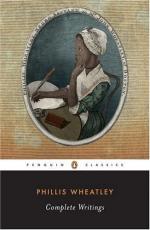|
This section contains 5,007 words (approx. 17 pages at 300 words per page) |

|
SOURCE: "Unprecedented Liberties: Re-reading Phillis Wheatley," MELUS, Vol. 18, No. 3, Fall, 1993, pp. 71-81.
In the essay that follows, Flanzbaum identifies in Wheatley criticism a problematic mixture of apology for the supposed mediocrity of her poetry's literary merits, and an unreflective astonishment that she was able to produce poetry at all. Flanzbaum's own commentary examines the emancipatory bargain that allowed Wheatley to write and publish her work.
The very fact that Phillis Wheatley, a black female slave, wrote at all has attracted more attention, prompted more theories, and inspired more heated debate than any line of her poetry ever has. From its very publication in 1773, Wheatley's book, Poems on Various Occasions, Religious and Moral, has served to signify more than itself. In the eighteenth century, Voltaire advertised her poetry as evidence of "genius on all parts of the earth" and the perfectibility of the Negro. When Thomas Jefferson claimed her...
|
This section contains 5,007 words (approx. 17 pages at 300 words per page) |

|


